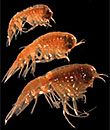For the first time, scientists have discovered species of Atlantic Ocean zooplankton reproducing in Arctic waters. German researchers say the discovery indicates a possible shift in the Arctic zooplankton community as
 the region warms, one that could be detrimental to Arctic birds, fish, and marine mammals. Studying traps that have been suspended for 13 years in the Fram Strait, scientists from the Alfred Wegener Institute found that small species of crustaceans common to the Atlantic are increasingly moving into Arctic waters. The researchers found fertile females as well as individuals at all stages of development, showing that the Atlantic species is reproducing in the frigid waters. The one-centimeter amphipods are smaller than respective Arctic species, meaning that the spread of the Atlantic crustaceans northward could reduce the volume of food available to Arctic predators. The research was published in the journal Marine Ecology Progress Series.
the region warms, one that could be detrimental to Arctic birds, fish, and marine mammals. Studying traps that have been suspended for 13 years in the Fram Strait, scientists from the Alfred Wegener Institute found that small species of crustaceans common to the Atlantic are increasingly moving into Arctic waters. The researchers found fertile females as well as individuals at all stages of development, showing that the Atlantic species is reproducing in the frigid waters. The one-centimeter amphipods are smaller than respective Arctic species, meaning that the spread of the Atlantic crustaceans northward could reduce the volume of food available to Arctic predators. The research was published in the journal Marine Ecology Progress Series.

The amphipod Themisto compressa